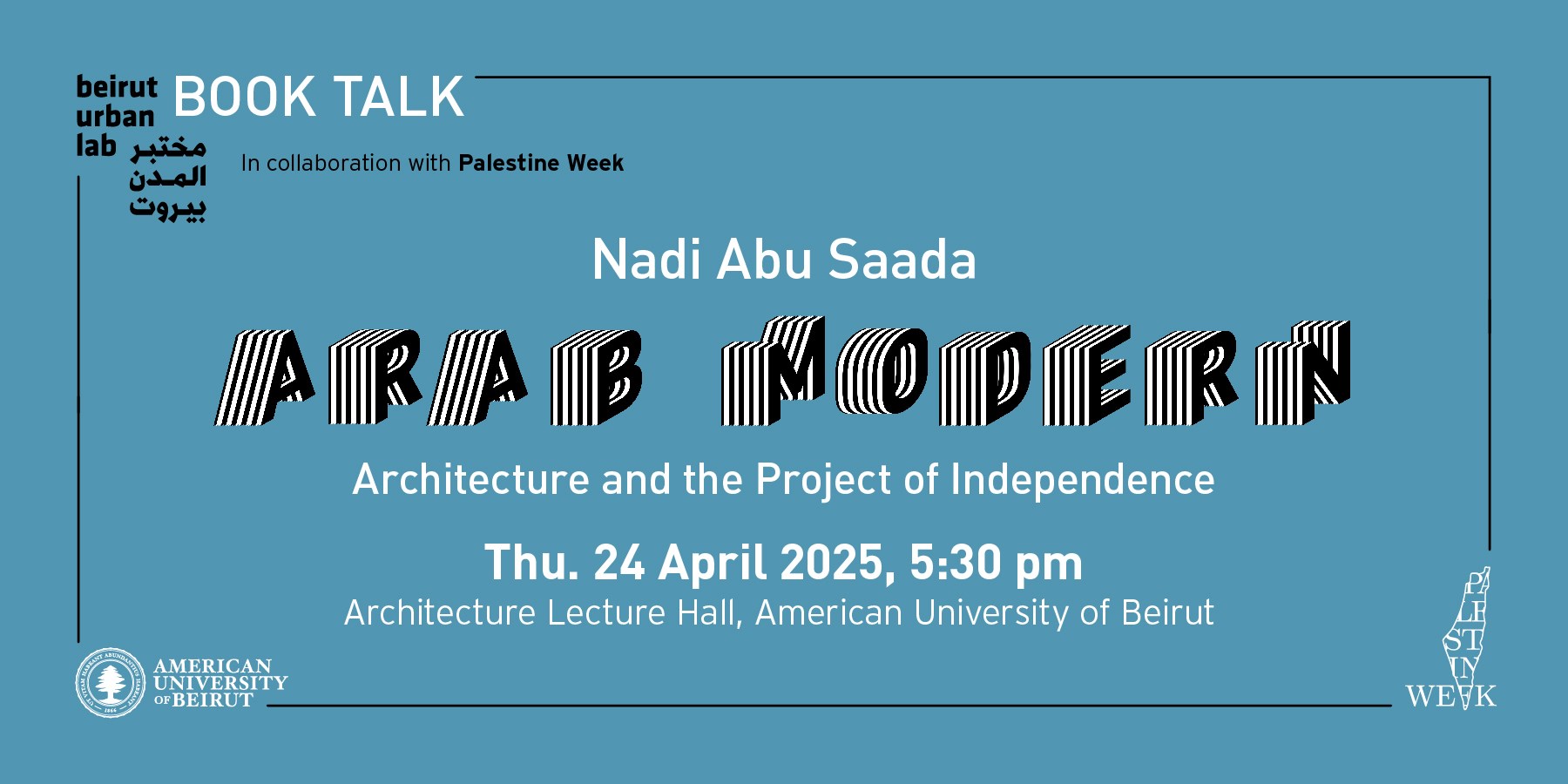Book Launch and Research Talk: Palestine in the “Arab Modern” Project

Join us for a book talk with co-editor and author Nadi Abu Saada, in collaboration with Palestine Week
Arab Modern: Architecture and the Project of Independence
Date: Thursday April 24, 2025 at 5:30PM
Location: Architecture Lecture Hall (ALH), Dar Al-Handasah Architecture Building, American University of Beirut
with discussants: Jad Tabet and Sonja Mejcher-Atassi
About the talk
Join us for the launch of Arab Modern: Architecture and the Project of Independence (gta Verlag, 2025), a new volume edited by Nadi Abusaada and Wesam Asali that explores how architecture intersected with the political imaginaries and cultural formations of Arab modernity across the twentieth century. Co-editor Nadi Abusaada will introduce the volume and its broader regional scope, before presenting his own research. The talk focuses on pioneering Palestinian architects and artists in the Mandate era, examining how their work contributed to the making of a local modernity embedded within wider Arab cultural and political currents. It highlights how this generation sustained ties with the broader region—through professional networks, exhibitions, and shared visual vocabularies—and shifts the lens away from a colonial frame by centering Palestinian actors within a regional history of Arab modernity, set against the backdrop of British and Zionist colonialism. The talk further reflects on the role of the historian as an amateur archivist, tracing the journeys and challenges behind researching the material histories of Palestine before 1948, and the fragmented archives through which this history is reconstructed.
Bios
Nadi Abu Saada is a Visiting Assistant Professor at the School of Architecture and Design at the American University of Beirut (AUB). His work focuses on the material histories and visual cultures of the modern Arab world. Nadi has earned his Ph.D. and M.Phil. degrees in architecture at the University of Cambridge and his B.A. in architecture at the University of Toronto. He was previously an Aga Khan Postdoctoral Fellow in Islamic Architecture at MIT and an ETH Zürich Postdoctoral Fellow at ETH Zürich. He is the co-editor of Arab Modern: Architecture and the Project of Independence (gta Verlag, 2025) and editor of Resurgent Nahda: The Arab Exhibitions in Mandate Jerusalem (Kaph Books, 2024). Besides his writings, Nadi has also been involved in research-based curatorial work. He has curated and participated in a number of exhibitions around the world including in Ramallah, Amman, Zurich, Venice, Dubai, and Montreal.
Jad Tabet is an architect and an urban planner graduated from the American University of Beirut in 1969. He was elected President of the Lebanese Federation of Engineers and Architects and President of the Organization of Arab Architects in 2017. His professional practice in Beirut and Paris has earned him several prizes and awards. He taught at the American University of Beirut, the Faculty of Fine Arts at the Lebanese University, the School of Architecture of Paris-Belleville and the Paris School of International Affairs- Sciences-Po Paris. He has authored several publications in Arabic, French and English on war and reconstruction as well as on the relationships between Modernity and Heritage.
Dr. Sonja Mejcher-Atassi is a professor of Arabic and comparative literature in the Department of English and an associated faculty in the Department of Arabic and Near Eastern Languages at the American University of Beirut. She is the recipient of the 2021 Alexander von Humboldt Foundation’s Reimar Lüst Research Award for International Scholarly and Cultural Exchange and the 2008 Annemarie Schimmel Research Award. In 2017/18, she was an invited resident fellow at the Wissenschaftskolleg/Institute for Advanced Study in Berlin. She obtained her DPhil from the University of Oxford in 2005 and her M.A. from the Free University of Berlin in 2000. Her research focuses on modern Arabic literature in global perspective and closely intersects with cultural and intellectual history. Interdisciplinary in scope, it engages with life writing/(auto)biography, memory studies, literature archives, global modernism, gender studies, interrelations of word and image, book culture/art, and aesthetics and politics.